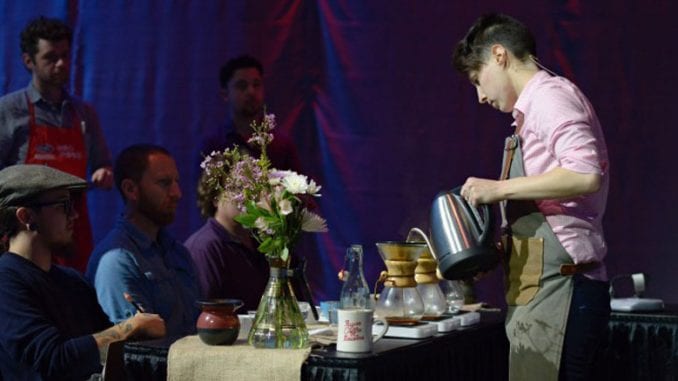
In this series, we’ll share the secrets of barista (and brewers cup) competitors. From choosing a theme to how to set a practice schedule, we’ll talk to seasoned competitors about how to compete smartly, efficiently, and effectively.
Photos by Sarah Valdovino and Tim Maestas.
This series, as with others I’ve written in the past, have focused on barista competitors. Some of that is from my own personal experiences—I’ve only competed in the barista portion of the competition line-up—and some of that comes from the attention that barista competition naturally gets. From news coverage to feature films, barista competition is often represented as the defining competition of our industry.
When we talk about preparing for barista competition, advice tends to be a balance of technical preparation and performance tips. Brewers Cup, on the other hand, is almost all about the technical. Barista competitors are expected to both serve good coffee but weave a narrative into their presentation. In Brewers Cup, there are no such barriers—it’s all about the coffee you present. “Preparing for Brewer’s Cup is like trying to preparing the perfect cup of coffee,” shares Blair Smith, café manager for Augie’s Coffee Roasters in Redlands, California. Blair competed in Brewers Cup in 2015 and 2016, and was one of the top 6 finalists at this year’s USBrC (United States Brewers Cup). She offers insights and tips on how to prepare for the sometimes overlooked, yet oftentimes more rigorous, Brewer Cup competition.

- In Brewers Cup, there are no rules.
“My first tip is to take every “rule” of coffee, and throw it out of your mind,” Blair says. There is no one way to brew a perfect cup of coffee, and that’s sort of the whole point of Brewers Cup—to push our understanding of what affects the flavor of coffee. “Each coffee will react differently to each technique you apply. Last year I cupped my coffee every day, and in competition I used the roast that cupped best day of. It was over a month off roast,” she shares.
This would be a good time to go off-script from what you normally do in your café. Perhaps you always bloom your coffee for 30 seconds, but what would happen if a coffee bloomed for a minute? Throwing out your brewing conventions helps you not to just unlock potential in coffee, but understand how specific parameters affect a coffee, and you can then manipulate your brewing parameters accordingly.

- Try your coffee on any brewer, any way.
The way most competitors choose a coffee is to cup, and then to find a brewer that’ll translate the flavors the coffee presented during cupping. But not every brewing device will pick up the same flavors that you admired on the cupping table. “When you cupped your coffee, maybe you might have noticed this intense tropical fruit acidity, with a very palpable juicy body. When you try it on your favored brewer it highlighted its acidity, but left the body falling flat.” It can be frustrating trying to chase something you tasted in a cupping bowl, but that’s why it’s important to try your coffee on as many brewers that are available to you. How do you pick which is best? “My advice would be to go with a brewer that can best highlight what you admired most when cupping,” Blair shares.

- Ask for help.
This seems obvious, but in Brewers Cup more so than other competitions, it’s easy to practice by yourself and not get input from others. “Ask people you work with or respect to try your coffee. Hearing from your roaster that your coffee tastes ‘dirty’ may not be what you want to hear, but it will cause you to evaluate what you can change to clean it up.” Because Brewers Cup is so hyper-focused on brewing one coffee, it can be easy to miss something because you’ve tasted the same coffee over and over. “It might be that after tasting the same coffee dozens of ways, that you are slower to notice if the finish of your coffee is dry or astringent.”

- Tasting notes are key to success.
At the end of the day, Brewers Cup is not just a competition of who can brew the best coffee, but who best understands the coffee they’re serving. If you can’t describe that coffee to the judges, then they won’t know that you understand precisely what you did to your coffee to make it taste the way it does. “Tasting notes are the backbone of this competition. Clear, precise tastes are always preferred over multiple guesses.” Right now is a good time to try lots of new foods. “Try different fruits, chocolates, nuts, and sugars. Try and create a vocabulary you can extract from later.” And be specific: “When you taste a pineapple, does it have a high sweetness and high acidity? Is it balanced or aggressive in flavor? These comparisons will help tremendously when describing your coffee.”

